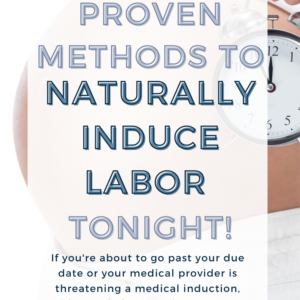When you are getting ready to meet your new bundle of joy, you will most likely want to have a birth plan. Especially if you are wanting a natural birth. Let’s face it. A natural birth is rarely heard of these days, so it is super important to be on the same page with your doctor so you both have an expectation of how you want the day to go. After all, if you want or need to change doctors or practices, you should learn that now! Find out if you are in the right place with these super important questions to ask your doctor for a natural birth.

OBGYNs are trained as doctors who use medicine and surgery. Medicine is in their training and nature; not natural birth. (This common knowledge is thanks to my favorite natural pregnancy and delivery books.) While many practices are moving toward a more natural approach, we still have a long way to go. I did a lot of reading and research with my first pregnancy to make sure I was prepared and knowledge in having a natural birth and what that meant for myself and my doctor. I’m breaking down the most important questions to ask your doctor for a natural birth.
[convertkit form=1775019]
Questions to ask your doctor for a natural birth
These are the questions I asked my doctor when I was preparing for a natural birth. I’m sharing the answers I was given and my opinion on the answers. Decide on what answers you are looking for and what are non-negotiables for you and your partner. Remember that you are in control of your care! If you don’t like your doctor or the answers to your questions, you can always switch practices!
1.| I’d like to have a natural birth with as few interventions as possible. What are your thoughts on this? Do you have any personal experience with natural births?
Chances are, your doctor may not have a lot of experience in natural labor! Not a lot of women are choosing the natural route, and if they do, they may end up choosing or needing an epidural or intervention. My doctor said that in her career, she only had a few patients who delivered naturally, but she was totally supportive of my wishes as long as baby and I were healthy. I was confident that she meant it because the office I was at had a lot of literature and practices that went along with a natural birth like: the option for chord blood banking, delayed chord clamping, rooming in with baby, immediate skin to skin contact, and encouraging nursing. I still asked the rest of these questions to make sure we were on the same page and that my doctor wouldn’t push for unnecessary interventions and uphold my birth plan.
2.| It is important to me to have freedom of movement during labor and be able to labor in different positions. What kind of fetal monitoring is typical for your practice? Would I be allowed intermittent fetal monitoring?
During labor at a hospital, the doctors and nurses will want to monitor baby to keep an eye on any indicators of stress. (These are those straps that get put around your belly.) This means you will have either continuous monitoring, which typically means you are laying in bed or have chords running from you to a pole you can wheel around, or intermittent monitoring, which means you can walk and move but will go back to your bed every hour or so to be monitored for 20-30 minutes to check on baby. I wanted and was allowed to have intermittent monitoring so I could help my labor progress by walking, showering and bouncing on a ball. Sitting still is an easy way for labor to stall and move you toward unwanted interventions.
3.| Under what circumstances do you recommend a c-section?
The ultimate goal of labor if for a healthy baby and mama. Sometimes a c-section is necessary, like if you or baby are in distress, blood pressure or oxygen are dropping, labor stalls, etc. Talk with your doctor about what circumstances might call for a c-section.
4.|If I don’t go into labor by 40 weeks, what is the protocol for a medical induction and how long past my due date can I go?
A lot of hospital practices won’t let you go past 41 weeks because they are nervous about the size of the baby and the health of the placenta, which supplies oxygen, blood and nutrients to baby. You sometimes can’t avoid nature and when baby wants to come. Some midwifery practices and birthing centers will allow you to go past your due date until you naturally deliver. I was scheduled to be induced because I went past my due date with Jackson. Luckily, these natural labor tips sped me into labor and gave me the natural birth I wanted.
5.| Is there a “time limit” to give birth?
This may sound odd but some hospitals will want you to deliver in a certain amount of time after being admitted or being in labor. Talk to your doctor on what this looks like for the hospital you will deliver at.
[convertkit form=1778735]
6.| Do you have natural birth equipment like birthing balls or birthing stools?
Ask for what natural birthing equipment they will have in your room and if you can bring your own if they don’t have any. This will also give you a good indicator of how natural-birth-friendly the hospital may be.
7.| Do you do delayed chord clamping?
Delaying chord clamping is becoming more of a norm. Most practices will delay for at least a minute, allowing extra blood, oxygen and nutrients to make it to baby. Decide how long you will want to delay clamping for and see if your doctor will support your wishes.
8.| Does baby room in with me after I deliver and during my stay?
For breastfeeding and skin to skin, you will probably want baby to room in with you, which means she/he never goes to the nursery to sleep.
9.| Can I bring a Doula?
A Doula can be a huge benefit and bonus to advocate for you during delivery and coach you through your natural labor. Make sure your hospital will allow your Doula to come along.
10.| Do you have a lactation consultant available after delivery?
Breastfeeding can be really hard. Having a lactation consultant that stops by to check on you or that you can request can be really helpful.
Remember that you have total flexibility of where you deliver! You can always change practices! If you aren’t finding a doctor or hospital that has the same birth plan in mind or doesn’t answer your questions well, you may want to check into midwifery or a birthing center, which are practices that gear more toward natural labor and delivery. You can go here to find a birthing center near you.
[convertkit form=1775019]
Like this post? Pin it for later!














Leave a Reply